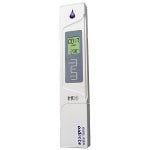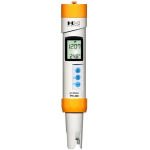When it comes to fracking, the process of using sand water and chemicals to fracture shale containing valuable natural gas, the debate seems to get more and more complicated each time we hear about it.
|
Sudden changes in TDS (total dissolved solids) readings in well water may indicate well water contamination by ‘fracking’ |
Now that the drilling has gone on long enough, people in the affected areas have started to reap some serious financial benefits from the activity and proponents of hydraulic fracturing now say that entire communities would suffer great losses (i.e. get decimated) if companies stopped drilling for natural gas nearby.
Restaurants, stores and other businesses in communities in and around areas where natural gas companies have set up hydraulic fracturing sites have experienced tremendous gains and as pointed out during a recent 60 Minutes broadcast, one community gained over 57,000 jobs.
|
Sudden changes in pH readings, how acidic or basic the water is, in ground water may indicate that well water has become contaminated by ‘fracking’ fluids |
Proponents of fracking tout facts and figures of that nature as additional evidence that fracking presents itself as a win-win situation from all angles.
Opponents view those facts and figures as good, yes, but for how long? As soon as the gas gets extracted or vanishes for an unknown reason, so will the money and so will the jobs. Life will return to normal for the permanents of those small farming communities, right?
Sure… Except for all the drilling equipment and structures left in place because it would cost more to tear them down and truck them elsewhere. Permanent eyesores left for future generations to gaze upon and wonder if any still contain dangerous fluids that may have started seeping into the ground as the equipment sits unattended, uninspected, and without proper maintenance.
HARRISBURG, Pa. — To supporters, it’s a 21st century economic boom that will benefit millions across the Northeast. To critics, it could be this century’s biggest national eco-disaster, tainting water supplies for tens of millions.
…
Combining a new process of horizontal drilling with fracking, drillers are unlocking vast deposits there and in other formations around the U.S. such as the Barnett Shale in Texas — a boom that could ensure cheap and plentiful natural gas for many years to come for homeowners, factories and power plants.
…
The drilling frenzy in the Marcellus Shale is also credited with enriching landowners and pumping new life into trucking companies, short-line railroads, quarries and steel-pipe makers, as well as the restaurants and hotels hosting out-of-state drilling crews.
An industry-financed study by Penn State projected that the boom would generate tens of thousands of jobs and hundreds of millions of dollars in state and local taxes in the coming years.
…
However, the use of fracking is raising pollution concerns across the Northeast.
While the industry maintains that fracking has been proved safe over the decades, homeowners are coming forward with tales of wells producing brown, foul-smelling water or water polluted with methane and chemicals.
In the northeastern Pennsylvania town of Dimock, a hotspot of Marcellus Shale exploration, some residents no longer use their polluted well water and can light their taps on fire because of methane they say seeped into their wells because of drilling. ( source )
Hopefully before this whole fracking thing (that almost sounded rude, right? Ha ha.) goes too far and we place weening ourselves off of OPEC’s oil and wallowing in ‘get rich quick’ wealth over the safety of our drinking water supply… someone will step in and implement some regulations the EPA can enforce.
|
The sudden appearance of dissolved metals in well water may indicate that ground water may become by hydraulic fracturing or other forms of subterranean gas/oil collection methods |
Some have argued that the government ought to require drilling companies to pay for mandatory third party testing of well water near drilling sites and continue to pay for testing in the affected areas long after their wells have run dry.
Needless to say, the drilling companies have fallen back on their argument that hydraulic fracturing poses no risk to the aquifers through which their boring equipment must pass because of the thick metal casing and cement drilling companies use to insulate surrounding ground from chemicals and compounds used their processes.
They also say that the actual insertion of fracking fluids takes place close to two miles below the surface, more than a mile and half away from the locations of most aquifers.
Our opinion of hydraulic fracturing?
At this point we believe erring on the side of caution makes the most and that allowing hydraulic fracturing, an industry not nearly as regulated as most others that could have serious effects on the environment, to continue unchecked could result in horrifying consequences for millions of people, if not entire vast regions of the country.
Testing of the water around hydraulic fracturing sites (by third party, independent laboratories) and compiling the data will help learn more about the effects of fracking on the environment. We believe that sort of testing and data compilation needs to get done before we let Big Business and our own greed get the best of us — and allow us to accidentally poison our own wells, the very source of our existence.







